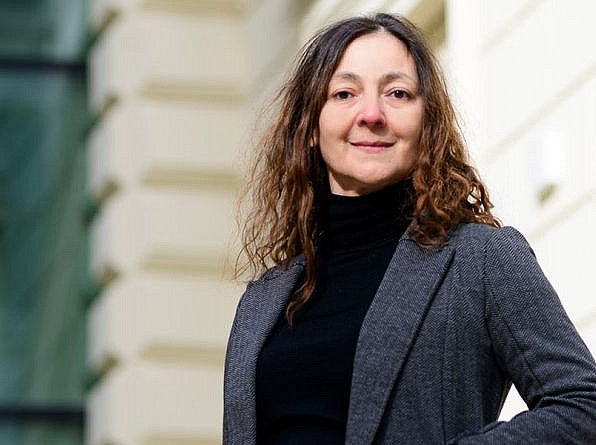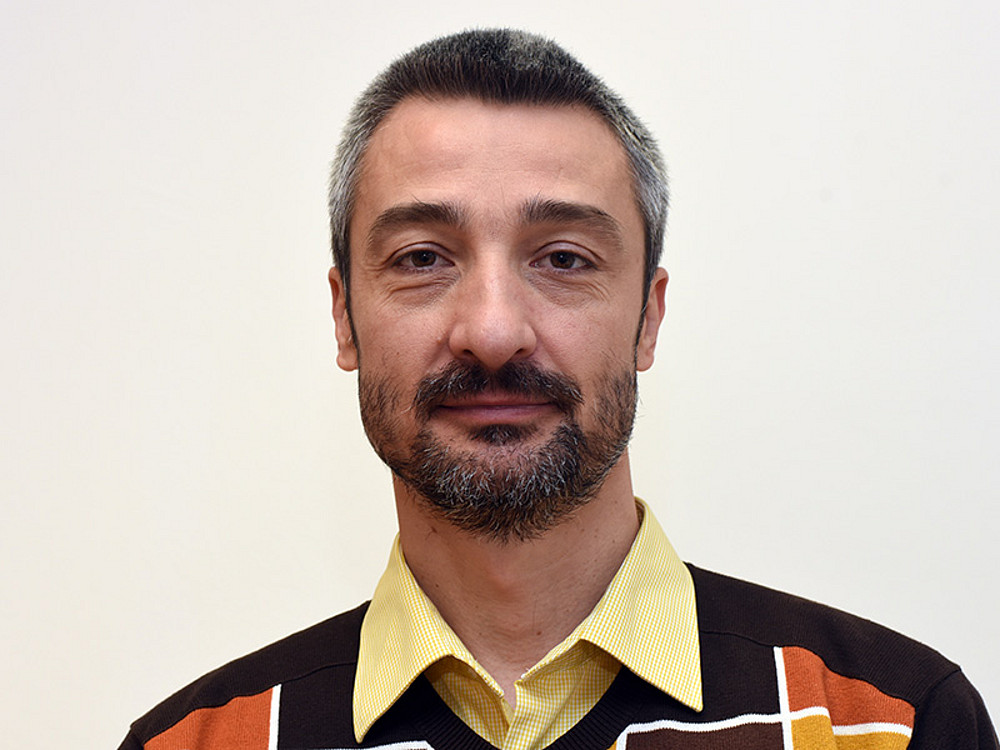In focus
We are in conversation with students and alumni, staff and guests of the Institute of Slavic Studies.
Tatjana Petzer
Professor of Slavic Literary and Cultural Studies at the University of Graz since February 2023
What are you currently researching?
As far as teaching and other university tasks allow, I am currently pursuing a project on ecological culture. I am investigating how social utopias, crises and changes have influenced the interaction between humans and the environment and have given rise to corresponding cultural practices. For example, the concepts of green cities and zones as well as architectures that connect with nature - how people build is always also an expression of a mindset. It is the transformational aesthetic of Slavic modernism that has been reflected in urban planning, architecture and landscape design since the beginnings of the Soviet Union after the October Revolution in 1917. I am interested in how the environment was designed from this perspective - both in designs on paper and in the actual implementation.

Do you see any differences to Western Europe?
Yes, while ecological thinking has been gaining importance in politics, society and culture in the West since the 1970s, it already has its own, longer tradition in the countries of the former Soviet Union. In my view, many an architect of the early Soviet Union was influenced by the concepts of the Ukrainian-Russian biogeochemist Vladimir Vernadsky (1863-1945). Wernadski's theory was based on the biosphere, i.e. the creation of a sphere of living matter from the geosphere. Man, as part of the biosphere, has reshaped our planet on a scientific-technical basis in such a way that a new earth envelope has developed from it, so to speak. Wernadski called this noosphere, in reference to the Greek word for spirit, mind. These concepts not only shaped the Soviet natural sciences, but also philosophy, art and literature. The geological and creative power of mankind holds great potential on the one hand, but also dangers on the other. Wernadski therefore advocated a planetary consciousness. Today we would speak of global thinking.
What about ecological thinking in view of the war in Ukraine?
Even in the post-communist, post-industrial society, the idea that humans can reshape themselves through new environments in cooperation with nature is groundbreaking for ecological architecture and landscape design. Wernadski's ecological biosphere concept can be found in current architecture and planning projects. In the Ukraine, think tanks have been formed that envision ecological reconstruction after the Russian war of aggression and the associated environmental destruction. They take up designs for green cities and spherical, flying architecture that were not realized at the beginning of the 20th century. Whereas in the early Soviet Union, designs for the use of solar energy were still utopian and were not developed further during the Cold War, today sustainable energy technologies are planned as a matter of course. This means that transformational aesthetic strategies also coincide with the EU's ecological goals.
The interview was conducted by Gudrun Pichler.

Boban Arsenijevic
Professor of Slavic Linguistics at the University of Graz since 2017
What made you decide to pursue the kind of linguistic research you do?
I've always loved math and everything to do with it. And I loved discovering things. Even small regularities, patterns in random everyday things, ways to simplify a task, to better understand something in my environment. I experienced the same enthusiasm in all school subjects, the joy of finding something out for myself and then being taught it after a few weeks.
However, there was one subject where I never had this experience: language lessons (I had Serbo-Croatian as my mother tongue and German as a foreign language). I figured out some cool regularities, came up with a mathematical formalization, but the material we learned about them was frustratingly stupid and wrong. For example, I would find out that the accusative case in target sentences is assigned not by the preposition but by the verb over the preposition, but we would be taught that the preposition requires a complement in either case depending on the meaning, and never take it a step further.
So I came to the conclusion that of all the sciences I came into contact with, linguistics had the most to discover. It turned out that linguistics is indeed as advanced as other disciplines, but it is only in linguistics that school programs are so backward.
So I can say that my choice of formal methods was determined by my affinity for mathematics, while the fact that I do research in linguistics is due to a wrong impression I got because of outdated content in language classes.
The two most important things you want to teach those you teach?
The comfort of truth. Where by truth I mean the process that begins with a distorted experience of reality and ends in beliefs that most closely match it. Beliefs about the world that are as free as possible from the influence of our feelings, desires and interests. These are beliefs about the world that want to be independent of our emotions, desires and personal interests. This concept of truth not only drives scientific research, but is also an essential prerequisite for a meaningful life and a solid foundation for mental well-being. In higher education and science, this realization serves as a persistent and powerful motivation to maintain its core purpose: the pursuit of knowledge and understanding, including the refinement and advancement of methods for obtaining empirical evidence and its subsequent modeling and explanation.
Recognizing that investing in learning or innovating the use of technology to simplify and accelerate tasks pays significant dividends. Whether using software tools, corpora or artificial intelligence, significant efficiency gains can be achieved with relatively modest use of these tools. Knowing that our students are not naturally tech-savvy and often benefit from encouragement and guidance, I strive to structure my courses to maximize the achievement of such goals.
The three most important things you want to accomplish in your (research!) career?
Fully develop and formalize a model of grammar in which structure is not generated (as in generative grammar), but emerges from the way in which continuous contents of sound and meaning are packaged into discrete units needed for symbolic-logical computations. In such a model, there would be only two narrow levels of grammar: logical form and phonological form, and the traditional levels of syntax and morphology would be replaced by translation algorithms that map between the structures of the two levels.
Creating the foundations of a theory of language that explicitly models the stochastic and logical-symbolic cognitive processes that language involves, and especially their interfaces. I expect that our CRC project will take an important step in this direction.
Establishing a standard status for the development of large databases of linguistic data (of the WeSoSlaw type, developed at our institute) annotated for the relevant grammatical properties, both as a benchmark for testing grammatical theories and as a vehicle for a leap forward for large language models based on the infusion of some logical-symbolic power.
The interview was conducted by Marko Simonović.